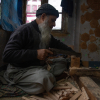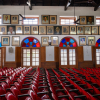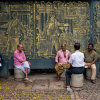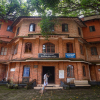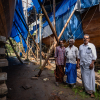I mark my passage
With words that smell life
— That’s All, K. Satchidanandan
K. Satchidanandan is arguably the finest poet writing in Malayalam. At 74, having published over 50 volumes of poetry, including translations from many Asian and European languages, he is both a peer and mentor to aspiring as well as established poets in Malayalam. He is also the most translated Malayalam poet in Indian and European languages—multiple collections of his work have been published in English, Italian, Chinese, Arabic, Spanish, German, French, Hindi, Tamil, Kannada, Bengali and Marathi, among other languages. His poetry has been celebrated across languages and cultures, as is evident in the scores of awards and honours he has received. He has also been invited to read at prestigious festivals across the world and deliver lectures at numerous academic institutions. His essays in literary and cultural criticism in Malayalam and English have been collected in over 20 volumes. Throw in the plays, travelogues, newspaper columns, editorials, and the numerous edited works, Satchidanandan is a library in himself.
However, Satchidanandan is much more than his published works. For many years, he taught graduate students in a small town in Kerala and edited numerous journals. This pedagogic streak in his professional life has, in fact, seeped into the core of his personality. For thousands of admirers he provides a moral compass in a fast-paced and deeply polarising world. He is definitely a teacher but more in the Socratic tradition, committed to dialogue, debate, discussions and constant renewal. From social media to lit fest sessions and interview slots to letters to editor columns, Satchidanandan is always in conversation with friends and foes alike, sharing sorrows laughs, writing out and signing petitions, speaking out for justice and arguing reason. Reading him, listening to him, makes one stay in tune with the times.
Satchidanandan was born on May 28, 1946, in Pulloott, a village in Thrissur district, Kerala, in a Hindu Nair family. His father, KC Shankara Menon, was a small farmer, and mother, K Kunjukkutti Amma, a homemaker. He studied in local schools and graduated in Zoology from Christ College, Irinjalakkuda. He did his postgraduation in English from the Maharaja’s College in Ernakulam in 1967. The Maharaja’s College then had a galaxy of well-known writers as faculty, and Ernakulam provided an urban experience to Satchidanandan, who, until then, had lived in the rural and semi-urban parts of Thrissur district. At college, Satchidanandan read widely, in Malayalam and English—poetry and fiction, classical and modern literature, history and philosophy. It is there that Satchidanandan started getting noticed as a promising poet and essayist among serious Malayalam readers. In 1969, he married Thulasi Devi (Bindu), and the next year, he joined the English faculty of Christ College. The same year, his first book, Kurukshetram, a study of modern Malayalam poetry, was published.
The modernist poetry in Malayalam by Ayyappa Paniker, N.N. Kakkad, Kadammanitta Ramakrishnan, Madhavan Ayyappath, M.N. Palloor, Attoor Ravi Varma, M. Govindan, Vishnu Narayanan Namboothiri, etc. had caught the angst of the 1950s and 1960s. These writers transformed the language and diction of Malayalam poetry by risking the ire and criticism of the literary establishment of the time. The individual was at the centre of this revolt in literature and all calls to subsume individuality in a collective self was viewed with deep suspicion by these writers.
The 1960s were also a period of transition. The age of Nehru had ended and the communist movement was in great turmoil. The peasant revolt in Naxalbari, the Vietnam War, the famine-like situation in the country, provided the conditions for a radical political and cultural upheaval in the 1970s. The cultural expressions of the 1970s, riding on a new wave of Red thought, of course, did not disavow the modernist tradition, but preferred to explore a new pact between the individual and the collective. These were stridently political and was unambiguous in messaging. The Bangladesh war and refugee influx, the Naxalite violence, the shock of the Emergency and curtailment of civil liberties turned the world upside down and found a resonance in the poetry, fiction and cinema of the 1970s. It is in the midst of a great turmoil that a young Satchidanandan discovered his voice.
Arguably his first standout poem, Ezhuthachhanezhuthumbol (When Ezhuthachhan Writes) was published in 1971. In this poem, we find a voice tracing his legacy to the sixteenth-century master poet who laid the foundations of modern Malayalam and exploring the relationship between the word and world. It is a work of self-discovery and a sort of statement by the poet that in the act of creation the creator and the object of creation become indistinguishable.
In Fever, a 1973 poem that captures the feverish spirit of the decade, Satchidanandan writes:
Why is it our poetry is not
black like the bursting pupils of our eyes?
Why doesn’t it sing lion-songs
in the depths of the woods like the wild Niagra?
Why doesn’t it flow fierce like the floods
of Amazon, its face swollen
and eyes red with nights of vigil?’
— asked he, sipping the sugarless tea.
I didn’t need to answer, had only to
turn my eyes to the moth-eaten map,
hanging limp on the wall,
to the dense desolation of that small peninsula.
‘Do you still love this land?’:
Words fell lightly, like dew on leaves.
‘ . . . but not this India, not this
valley of skeletons’.
The poems of this decade (Satyavangmoolam, Bodhavati, Naavumaram etc.) were powerful utterances that captured the spirit of that time in a language and idiom that was feverish in tone, invoking fierce imagery and drama. There was also the odd poem, Mazhayude Nanartham (The Many Meanings of Rain), a shower of images new to Malayalam poetry. It also revealed a poet who could charm words to turn into images unseen before in the language.
The political promise of the Seventees died quickly and disillusionment set in. The violence unleashed against, and by, the Naxalites turned many artists who had associated with the movement against it. In the case of Satchidanandan, it made him revisit the theory and praxis of revolutionary politics. The angry collective ‘We’ in his poetry made way for a more reflective ‘I’. Poems like Ivide Njan Otteyakunnu (Here I am Alone) mark this rupture with the old paradigm. The new politics that emerged from the radicalism of the Seventees, among them environmentalism, gender, caste, found a reflection in his poems of the 1980s. A gentler and deeply empathetic and reflective voice emerged, which always spoke up for the marginalised, for justice. The Buddha emerges as a moral figure in these works—Satchidanandan’s Buddha’s poems makes themselves a fascinating excursion into the various dimensions of Siddhartha Gautama’s political religion. The pursuit of justice, an underlying theme even in his early days, becomes the elemental theme of Satchidanandan’s poetry. The Buddha and Gandhi are transformed into discursive subjectivities to explore the ethics of justice and morality of politics.
This strand of inquiry has since become a defining feature of Satchidanandan’s poetry in the later decades.
Like his mentor, Ayyappa Paniker, Satchidanandan has also been a prolific translator of world poetry into Malayalam. He has translated poetry from Latin America and Africa, Europe and Southeast Asia, young and old poets, conservatives and radicals, with the intent to renew the language and its imagination and to ensure that young poets (in the pre-internet age) stay familiar with the trends and trajectories of world poetry. While he has been a window to the world, Satchidanandan has also been an ambassador for Malayalam poetry, translating the young and the old for a global audience.
His critical studies, especially introductions for short story collections of M Sukumaran and Sara Joseph, have been seminal, introducing categories such as feminism, eco-feminism and national-popular to Malayalam literary public. His engagement with Kerala’s modernism has resulted in studies on poets such as Edassery Govindan Nair, Balamaniamma, Ayyappa Paniker, Kadammanitta, among others. His continuing engagement with the Bhakti tradition in India has led him to write a series of poems on major saint-poets such as Meera, Kabir, Nanak, Bulleh Shah, Andaal, Naamdev, Lal Ded, Tukaram and so on. His reading of the Bhakti as a counter-tradition to Hindutva is a significant political intervention.
Since the early 1990s, Satchidanandan has been a resident of Delhi. During his stint at the Sahitya Akademi, first as editor of Indian Literature and later as secretary of the Akademi, Satchidanandan transformed this sleepy sarkari building into a vibrant public space. He was instrumental in making literatures from all over India and across caste and gender heard in various Akademi platforms. This spirit is now visible at the Kerala Literature Festival he curates every year in Kozhikode.
Even half a century after he started publishing, Satchidanandan hardly sounds old or stale. He has constantly renewed his language, idiom, and thoughts to remain a fresh voice. His willingness to read the youngest poet in his language with love and care, and acknowledge if she has something to offer to Malayalam is an extension of his poetic persona. He may have won awards, worked with governments, but deep within him there still lives an untamed creative beast burning with the hunger to create, deeply in love with fellow beings, refusing to be satisfied with bare life and minimum existence. As he once wrote: ‘The beast that remembers the woods will not easily tame. I remember the woods.’ The woods are in his poems.
Following is the edited transcript of the video conversation with K. Satchidanandan conducted by Amrith Lal B on August 27, 2019.
Amrith Lal (AL): Prof. Satchidanandan is one of the most important intellectuals of our time. Primarily a Malayalam poet, he writes in English and Malayalam. He has been writing since the 1960s, on a host of subjects, including poetry and literary criticism. He also translates works of world literature into Malayalam and Malayalam literature into English, and comments extensively on public affairs in English and Malayalam. In this interview with Sahapedia, Satchidanandan elaborates on the various aspects of his life and work.
May we start with your formative years. You grew up in a village near Kodungallor. The site itself is very interesting and it is an interesting time—a newly independent India, Kerala was being constituted. What were your formative influences when you started writing?
Satchidanandan (S): In fact, I started writing in a way while I was in school. I said in a way because I do not take that very seriously now. I did not have any poet predecessors in my family, except that my elder brother used to write at that time. Later, he stopped writing.
I grew up in a village which I think had a major formative influence on my writing because the memories of the village keep coming back to my poetry. And those keep inspiring me even now. I go back to my childhood, I go back to the nature of the village, so there was that kind of a Wordsworthian atmosphere in the village. I used to swim in our pond, pick flowers and climb little hills in the village. In fact, I think has stayed with me; later, maybe it grew into an interest in the environment in general.
I studied in very ordinary schools, government primary school and management upper-primary schools, and in government high school in Kodungalloor, where I had to cross a river and go to the school. But the reading that I did in my childhood again has stayed with me. Mostly, we had two libraries in the village at the time. That was the time when the library movement in Kerala was quite dynamic. And libraries were coming up in every little town and village. So, there was one library which was close to our home and there was another library which was close to my school. And then of course there were the school libraries which also I used occasionally, but mostly my readings were done in those libraries.
I grew up reading the original works by the writers who were famous at that time, because it was the time when modernism had not really entered Malayalam literature. So, I read Thakazhi (Sivasankara Pillai) and Kesavadev, also the poets like VyloppiIli (Sreedhara Menon), Edassery Govindan Nair, G. Sankara Kurup, and then the three famous poets of the time—P. Bhaskaran, O. N. V. Kurup and Vayalar (Ramavarma). That reading, along with the readings of translations of great poetry and great fiction, especially Indian fiction, had a lot of impact on me. Not only Indian fiction, I would say, Russian fiction was extremely popular at that time. So, I read [Leo] Tolstoy and [Fyodor] Dostoevsky and [Ivan] Turgenev in translations. I read Bengali major novels in translation, as every Malayali of my time must have done. And indeed poetry, of course [Rabindranath] Tagore’s poetry, in the beautiful translations done by G. Sankara Kurup, was another influence. Because Tagore, as we all know, had a great range and variety in his poetry, and I believe Sankara Kurup was able to capture the beauty and the nuances both of his language and the whole world that he created, and his vision in his translations. That is one of my earliest memories of reading poetry.
There is another memory that goes further back. That is of reading Malayalam Ramayana, Adhyatma Ramayanam, written by Thunjathu Ezhuthachan. As you know, like all the Ramayanas in the languages, this was not a translation, this was a transcreation of the original Adhyatma Ramayanam where the poet used his own imagination, created his own landscapes and gave his own colours to the characters like all the Ramayana writers did. But the reading of Ramayana was in fact my first major experience of what poetry is and what poetry could be, because he used metres with reference to particular contexts. He had a great command over Malayalam language—of course, he is supposed to be the creator of modern Malayalam language. The way he used metres, the way he described wars, described love, described the absolute despair and dilemma of Rama as a character, all these have stayed with me, and I have been going back to Ramayana and finding newer and newer meanings—looking at Rama also as a tragic figure who was always caught in a dilemma between love for his wife and power. And this kind of a contradiction between love and power has been again one of the themes I have been exploring in my poetry in various ways. So, Ramayana and Tagore’s poetry, particularly Gitanjali and Ekottarshati—One Hundred and One Poems that G. Sankara Kurup translated. So, they remain two of the major influences on my poetry even today, even though in very oblique and indirect ways.
I began to write while I was in school. I had some wonderful teachers. I remember particularly a Malayalam vidwan (teacher/scholar) called Neelakantha Das who was the father of one of my friends, late T.N. Joy. He had retired from the high school and then joined the upper-primary school where I was a student. He again introduced me to various important Malayalam poets and taught me the elements of the craft of poetry. And then going to Christ College to do my degree again developed my love for reading. That was where I read some of the major masterpieces of European fiction and European poetry and of course Indian poetry, Indian fiction and some theory. That was also because it was a Christian College, maybe; I also read the Bible very closely. I read so many things, but the Bible and Shakespeare were the two major things that I read while I was a graduate student. Those again have remained with me. The Bible moved me deeply as deeply as perhaps only Mahabharata has done. The ideals of Jesus Christ, the idea of compassion, of charity, of equality, the kind of great cosmic vision that Jesus had and all those fascinating stories of the prodigal son and many of those stories, parables in the Bible, some of which I used in my poetry. All these fascinated me a lot. And also, the poetic parts of the Bible, like the Psalms of David and some parts of Revelation, which one can say today are quite surrealistic. So, these gave me some ideas about forms and also gave me a vision of human life which again has been a lasting influence on me. And I spent a whole vacation reading all the works of Shakespeare, all his plays. I took notes on each of them. I read all the poems of Shakespeare and all the sonnets which much later I translated. Shakespeare gave me an ideal of what a poet should be. His range, his great comprehension of life, his insight into the contradictions of life, his intuitive understanding of relationships and his continuous resistance to forms of power, and forms of corruption, which is particularly reflected in his historical plays; these again gave me great lessons in poetry. Even though he was primarily a playwright, I would say his plays are also essentially poetry. Also the way he used words, the way he combined them, the way he summed up things, and reflected on the contradictions of existence, the anguish of living and being . . . these continued to haunt me and even now continue to haunt me. So, I keep going back to Shakespeare like I keep going back to the Bible.
Another influence that came when I was a postgraduate student at Maharaja’s College in Ernakulam was the reading of Buddha’s Dhammapada. I have always said that the Bible and Dhammapada have been two of the major influences on my writing and my vision of life. But if you ask me what the epic that has deeply impacted me is, it is certainly Mahabharata, more than Ramayana. Ramayana has had its impact as I said earlier but Mahabharata is an unparalleled kind of epic whose range cannot be compared to any other epic in the world, whatever I have read, including The Iliad and The Odyssey, The Divine Comedy and other epics. Because you have every facet of human life, every pain and every pleasure, every contradiction that a human being suffers from in Mahabharata. That is the second text that continues to inspire me in many ways. Sometimes, it also helps me to interpret what is happening today. Because Mahabharata has that kind of an appeal, it is not just a book that belongs to some past age, but it is a book that is always contemporary. It travels with us, it helps us understand what is happening around us, for example, in today’s politics. I have written a poem called ‘Mahabharata’, which I wrote in 2013 which unfortunately happened to be ominous. So, these are some of the major books that have in some ways influenced me. After that I have been reading all the major European classics and almost all the major poets whom most of us know.
It was when I was a postgraduate student again that Malayalam literature began to enter what has been called the modernist phase. Even though now I have doubts about using words like modernism and postmodernism and all that, because now I have come to think more and more that modernism is not a movement that belongs to a particular period but a quality of poetry. So, I find Kabir absolutely modern, contemporary. I find Mahabharata something modern. So, what we call classics ultimately has an element of which I would call modernity today. That was a period anyway when modernism entered as a movement in Malayalam literature. We had fiction writers like O.V. Vijayan, Kakkanadan, M. Mukundan and other people. And we had poets like Ayyappa Paniker, and many others like N.N. Kakkad. I need to mention Paniker particularly because he was something of a guru to me, in the real sense of the term. I met him first when I was an MA student; by the time, he had written some of his well-known poems like Kurukshetram and just then when I met him, his ‘Mrytupooja’ [‘Hymn to Death’] had been published in the Mathrubhoomi Weekly. Paniker has remained a major kind of teacher and guide to me all through in my reading, in my writing, because we always corresponded; even when he was in the US, I would get at least one letter every week from him. He continued to be a major influence on my poetry. And the kind of diversity and variety that you may find in my poetry, I believe have come to a great extent from Paniker. Because he also experimented with different types of metrical forms, different kinds of prose, various tones of ordinary speech and writing; so, this kind of tendency to experiment, the tendency to remain a part of the avant-garde, that in some sense was taught to me by Dr Paniker.
AL: In the 1960s, you found space in the mainstream media. Some of your earlier works were published during this period. ’60s was also the time when many major sociopolitical events were happening—split in the Communist Party of India, and a growing sense of disillusionment with Nehruvian India. You were writing a very intense, personalised, one could call, existential poetry. So, when you look back at the 1960s, how does it speak to you?
S: Yeah, in the 1960s, as I said, the modernist kind of poetry that was being written, not only poetry but also fiction and other things which were being written not only in Malayalam but in other Indian languages too, had a great impact on me. That was essentially a poetry of disillusionment. I said essentially because when I look back, I find that it was not exactly so. Even Paniker, he was writing poems addressed to death and all, poems like Kurukshektra, etc., poems of great existential dilemma; he also wrote poems addressing the morning, addressing the sun, addressing fire, so he had poems of hope too.
But it was the tragic element in modernism, the kind of disillusionment in modernism that fascinated me as a very young man because that was also the time when politically, on one hand, there was hope—there was this Nehruvian hope of a new India, which was hoped to be an egalitarian, an independent India, an India where liberalism would really flourish; so, there was hope—there was also despair; there was a retreat of Gandhian values from politics, politicians were beginning to be corrupt. Well, there were people of integrity like Nehru himself—but if you looked at the common politician around you, you would find that many of them were in some sense corrupt or power-hungry. The hopes especially the poor people had, they were not able to realise those hopes. So, there was also this kind of disappointment with what I can call realpolitik, and a disappointment with the failures of many dream projects that visionaries like Nehru had.
I shared, as a young person, that hopelessness, and that might have been one of the reasons for that. Secondly, subjectively, there was some inexplicable kind of sadness in me. I used to sit alone when I was in the Maharaja’s College. I used to sit on the banks of the backwaters and sometimes look at the sunset and weep. So, there was a kind of sad person, there was a kind of instinctive melancholy in me, which of course, I later overcame, with hard work and a lot of hope. So, I was a kind of sad young man, and all this social kind of sorrow that surrounded me, also impacted my poetry in a way. So, the disillusionment of the modern poetry in general, my subjective despair, and the social despair, all these contributed to the kind of grief and disillusionment that you may find in some of my earlier poems.
Al: You were also reading a lot of M.N. Roy, [Jean-Paul] Sartre, etc. at that time.
S: Yeah, that is another part of my intellectual autobiography. As a postgraduate student, I was reading a lot of Western poetry—British, American and European. I was reading the French symbolists like [Charles] Baudelaire and [Stephane] Mallarme and [Arthur] Rimbaud and several other poets. I was also reading T.S. Elliot which was also a part of our curriculum. And [W.H.] Auden and [Stephen] Spender and all those other modernists. I was reading some of the contemporary writers and some writers who went before them like [Franz] Kafka; it was during that time I read Kafka and was deeply impressed by the dark and the morbid world that Kafka opened before me—Amerika, The Trial, The Castle, also stories like ‘The Metamorphosis’. And then I was reading Sartre because Sartre was a major kind of cult figure in those days. Plays like Leis Mains Sales, The Flies . . . And then the three novels of the trilogy like The Reprieve and all that, then his Being and Nothingness and Existentialism as Humanism and all the major works.
I also wrote a series of 10 articles on Sartre in Malayalam and published them in a monthly called Kerala Digest which is no more. So, that was the first introduction to Malayalis also—Malayalis who were not familiar with Sartre—Sartre and his major works. So, you can imagine the kind of conflict I had gone though. I was reading three very different kinds of things. I was reading Marx, The Communist Manifesto, the various works of Marx and Angels . . . I was guided very much by a professor called Bharatan who was a professor of political science and who had many MAs in all kinds of subjects. Then I was reading M.N. Roy, who originally was a Marxist and later became a radical humanist. I was reading his works like New Humanism and Beyond Revolution, the book on revolution and renaissance and his various other works.
So, that was a time of turbulence, spiritual turbulence in fact; there were many persons in me fighting against one other. I was trying to figure out what was right and what was wrong. I wouldn’t say I arrived at any conclusion at that time; I was doing different kinds of things which perhaps contradicted one another, but which perhaps also had something in common, as I now find as I look back. Because all the three of them . . . Roy and Marx and Sartre, if you finally look at them, all three were humanists and there was the core of humanism in all the three philosophical strains. That is what ultimately has stayed with me and influenced me as a thinker—even though I don’t claim to be a thinker in any large sense of the term—whatever thinking guides me is what I mean. In fact, now I have come to a stage where I am beginning to learn to reconcile systems of thought which I once had thought were contradictory. For example, [M.K.] Gandhi, [B.R.] Ambedkar and [Karl] Marx, a lot of people have pitted one against one another. Ambedkarites don’t like Gandhi and Gandhians say Marx advocated violence, which he never did by the way. So, they have always been looked at as contradictory thinkers who contradicted one another. But now when I read late Marx for example, his newer New-York Tribune articles and the later editions of Das Kapital, which he rewrote during his last days and all the later studies he made of ancient culture and of slavery, especially the slavery of the Blacks, I find that he was coming very close to Gandhi. There was no single Marx, as you very well know, as there was no single Gandhi either; Marx was evolving till the very end, and now he said that, well, it is not the proletariat that is the only revolutionary class, the slaves also have potential revolutionaries in them. This he learned in the American Civil War; he found potential radicals in the Black slaves, in the primitive kind of workers in Asian countries, along with the industrial labourers. So, it was not the urban white labourer who was going to liberate the Black slave but the Black slave would liberate himself or herself. He had come to that towards the end. This is something that very few Marxists themselves would know. But today, I am rediscovering Marx. I was taken up by early Marx and middle Marx and now I find late Marx even more relevant. And if you read late Marx, you would not find so many contradictions between Ambedkar and Gandhi either. Because Ambedkar’s idea of annihilation of caste, Ambedkar’s identification of class with caste, to a great extent that is what [Frantz] Fanon said in the Wretched of the Earth— ‘To be Black is to be poor’. That was the idea that Ambedkar also to a great extent had. And Gandhi’s idea of Swaraj, of liberation from the grassroots, and the dream of self-sustaining communities who would themselves decide what they should do and how they should get governed and what mode of development would suit them. So, these ideas ultimately are not contradictory as it is often presented. And they often complement one another. And perhaps at very critical times like these, we need to reread Gandhi and Ambedkar and Marx in our own way and try to create a very creative and positive way of looking at things and reshaping our understanding of politics, our understanding of social reality, and our understanding of the struggle for a free and democratic India.
AL: You spoke in detail about Gandhi. But there was a period in the ’70s, where you were seen as a primary voice for Left-wing ferment in Kerala society. Most people actually remember you for those poems than for the more reflective poems which came later. Particularly, the ‘Ezhuthanchan Ezhuthumbol’ (When Ezhuthanchan Writes) which you wrote in 1972, I think, you were 25 years old. You are finding your voice in this poem, a very multilayered poem.
S: That poem was in my second collection. Though my first collection was very, very amateurish, I was experimenting—trying different things, tones and metres and all that. But as you very rightly said, I believe that I began to find my own voice in the second volume of my poetry.
AL: A lot of the themes that appear in your poetry appeared in your second poetry collection.
S: Yes, many of those themes and modes later got developed in my later collections.
AL: It is also a poem on writing poetry itself in situating ‘Ezhuthachan’ at the centre of . . .
S: It is a poem of creativity, it is not a poem on Ramayana; it was a poem on the act of creativity, about inspiration, about that particular moment that burns you down, from which you resurrect, and from which ultimately your poem also comes alive. So, it is my attempt to understand this whole act of creativity which is sometimes like a whirlwind that seems to affect you and take you to places that you never dreamt of and makes you use language in ways that you had never thought of before. So, I was trying to understand that, that strange tempest called poetic creativity.
AL: One particular strand in that poem is the question of justice. You take characters like Shurpanaka and specifically talk about justice, and it is that strand which you find in other poems like ‘Pani’ and ‘Satyavangmoolam’. In all those major poems in the ’70s, this is the strand that you seemed to be lingering on. So, when you look back at those poems . . .
S: I can connect those poems even with my earlier poems in the first collection. There is a poem called ‘Vietnam’, for example, because Vietnam War was something that deeply moved all of us, because it was a small nation fighting against a huge power, and then finally winning, and, so, that poem ‘Vietnam’ is like a nightmare, but the war and the sense of justice and the moral battle that was at the core of that war, had moved me and many of my friends very deeply. So one can trace perhaps my poems of the ’70s to ‘Vietnam’ to the poem like what you suggested, the later poems that I wrote like ‘Tree of Justice’, and the Pulaya songs and the Paraya songs, and various others, like many of those folk things that I tried. I tried because that was also the time I was reading poetry, not to very elite audience but to ordinary people. Behind all those poems of the ’70s, mainly there is this idea of justice, which is more than a personal idea, but a larger idea of social justice. And the idea of love which again is not a romantic idea of love but a larger idea of love which new Marxist thinkers agreed with and began to speak because they brought back love into their Marxist thinking, into their revolutionary thinking, and they used love in this sense, something that binds all the oppressed together. In that sense, that kind of love and the sense of justice, both these had ultimately inspired all these poems of the ’70s which endeared me to quite a lot of young people of that time. Many of them want to remember me by those poems even though I would . . . I would not like to forget those poems, but I would also like them to look at the poems that I wrote later.
AL: You mentioned love in the context of revolution. The departure from the ’70s’ poems—there is that great poem, ‘Oduvil Njan Ottayakkunnu’ [Finally I am Alone], where you speak about people talking about revolution without karuna [compassion] in their hearts.
S: Very true. That is again a major poem. I am not speaking about the quality of my poetry, but in the evolution of my poetry that was a major poem, because that was the time when the People’s Cultural Forum had broken down, the Marxist-Leninist movement itself was split and there were so many sections and all that. Many, including some of my friends and students, committed suicide; some literally went mad, there were quite a few. I remember Sanal Das, I remember Subramanya Das, who was my own very dear student, who committed suicide, and there were many like that. That was a tragic time because there was great hope in all of them to fight, to join the revolutionary ranks. Then they found that, well, a revolution was in a very distant horizon and they were not going to see it in their lifetime. And they created a kind of impossible dissolution and darkness, and that affected me also very deeply, and I have very often said, had I not been a poet, I would not have survived that crisis. It was such a dark time when I felt we had no hope of salvation at all. But how did I find that hope again? Because this particular poem ‘Finally I am Alone’ has despair, but ultimately there is also a kind of hope in it. As you very well said, it was also inspired by the idea of compassion and how there can be a revolution about this basic compassion, the idea of compassion I always connect with Buddha and Dhammapada. I go back to it again and again. And I found many of these comrades with whom I had some intimate relationships in those days; they used to come to my home and we used to spend nights talking about what to do. But I found many of them extremely dry theorists; they were not moved by love and compassion, but some kind of a very dry, inhuman idea of revolution and all that, and I found that there was very little distinction among the [various] power mongers I found all around who also thought that one day they would also become Stalins or Pol Pots or even worse. So, that was a point of break for me with that movement and there was the breakdown of the whole political movement and cultural movement and there was a period of despair. And then I found that new movements were coming all around. There was the Dalit movement—I was the first to translate the Dalit Marathi poems from English into Malayalam. Poems by Raja Dhale, Namdeo Dhasal, major Dalit poets, much before Dalit poets were known in Malayalam, there were [my] translations in magazines called Chitrakartika; I was also translating the Digambara poets—Digambara Kavulu of Andhra. So, there were movements coming up—workers’ movements, peasants’ movements, even outside the Marxist-Leninist movement, like the railway workers’ strike, port workers’ strike, which almost stalled the whole country. Then there were women’s movements coming up—idea of women’s liberation was slowly catching up, and there were small groups discussing women’s liberation. So these new uprisings, what I could call new movements, autonomous movements in themselves—the Dalit movement, women’s liberation movement, the new movements of the peasants and labourers which were not always connected to political parties—they gave me a kind of new hope, gave also a new direction to my thinking and during all these periods, I was also editing journals. All this went hand in hand. I don’t find any contradiction. The magazines I edited during the time, the articles that I edited, the poetry I wrote, the transitions that I made . . . somehow all fell into place, all of them somehow united my own divided self. I had run an avant-garde magazine called Jwala and then I started a new journal called Uttaram which means an answer—not that I was giving an answer, I was looking for answers. So that was a magazine of new thinking where I went back to Antonio Gramsci, Rosa Luxemburg and other Marxist thinkers, who were not necessarily Leninists, who had problems with Leninists, for example, someone like Rosa Luxemburg who argued for a democratic society and not a dictatorship. So, I went back to those thinkers and also others like Lucio Colletti and [Louis] Althusser, and quite a few others who were coming up in the Left tradition but not in the traditional Marxist sense. So, I was reading them. This magazine was a kind of platform for that kind of new Marxist thinking and also other forms of new movements that were coming up. That saved me partly and, as I said, I was able to express my pain in poems like ‘Finally I am Alone’. Being able to express oneself is a major way of surviving those absolute moments of despair that might drive somebody even to suicide. But those who had the ability to write somehow managed to survive.






